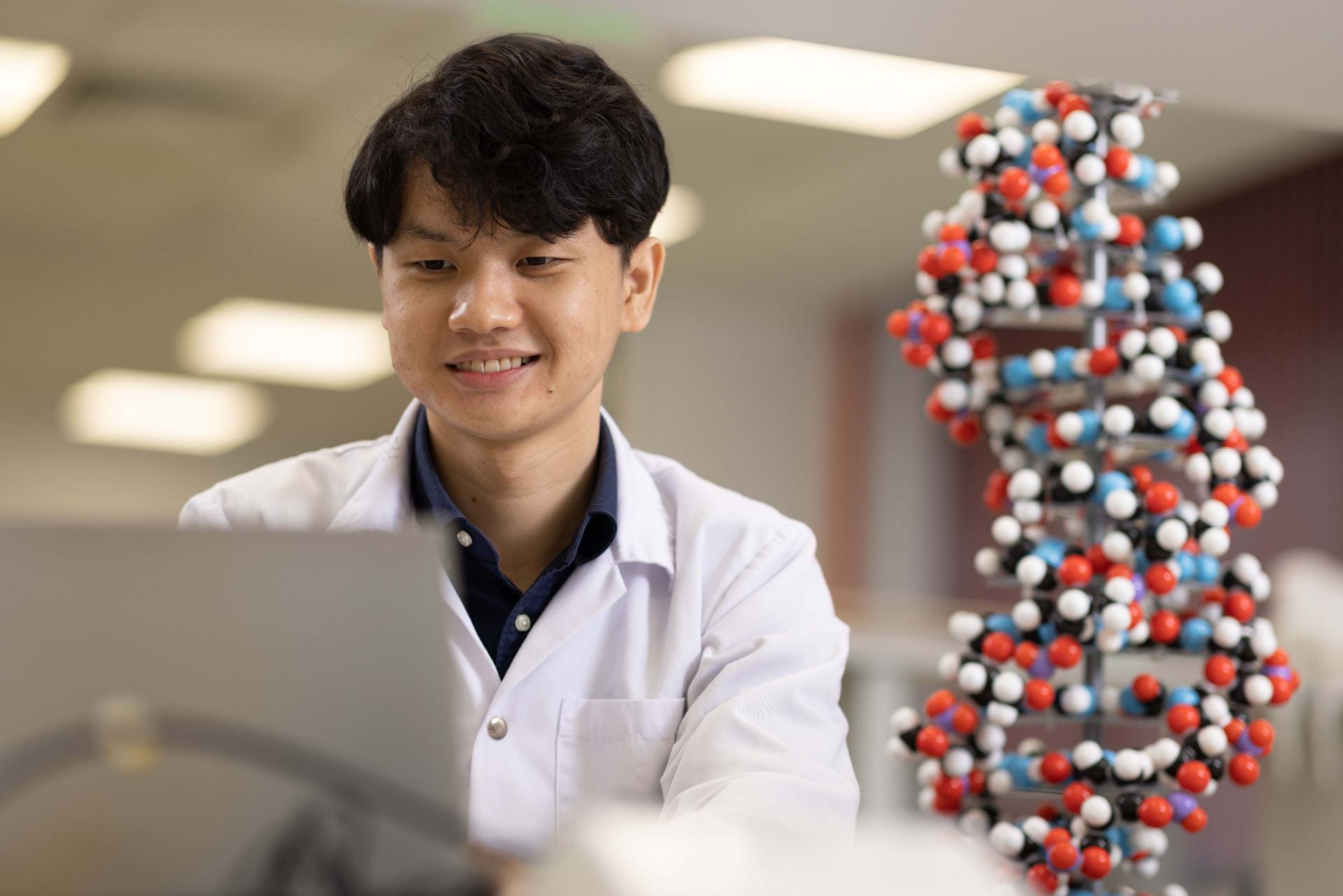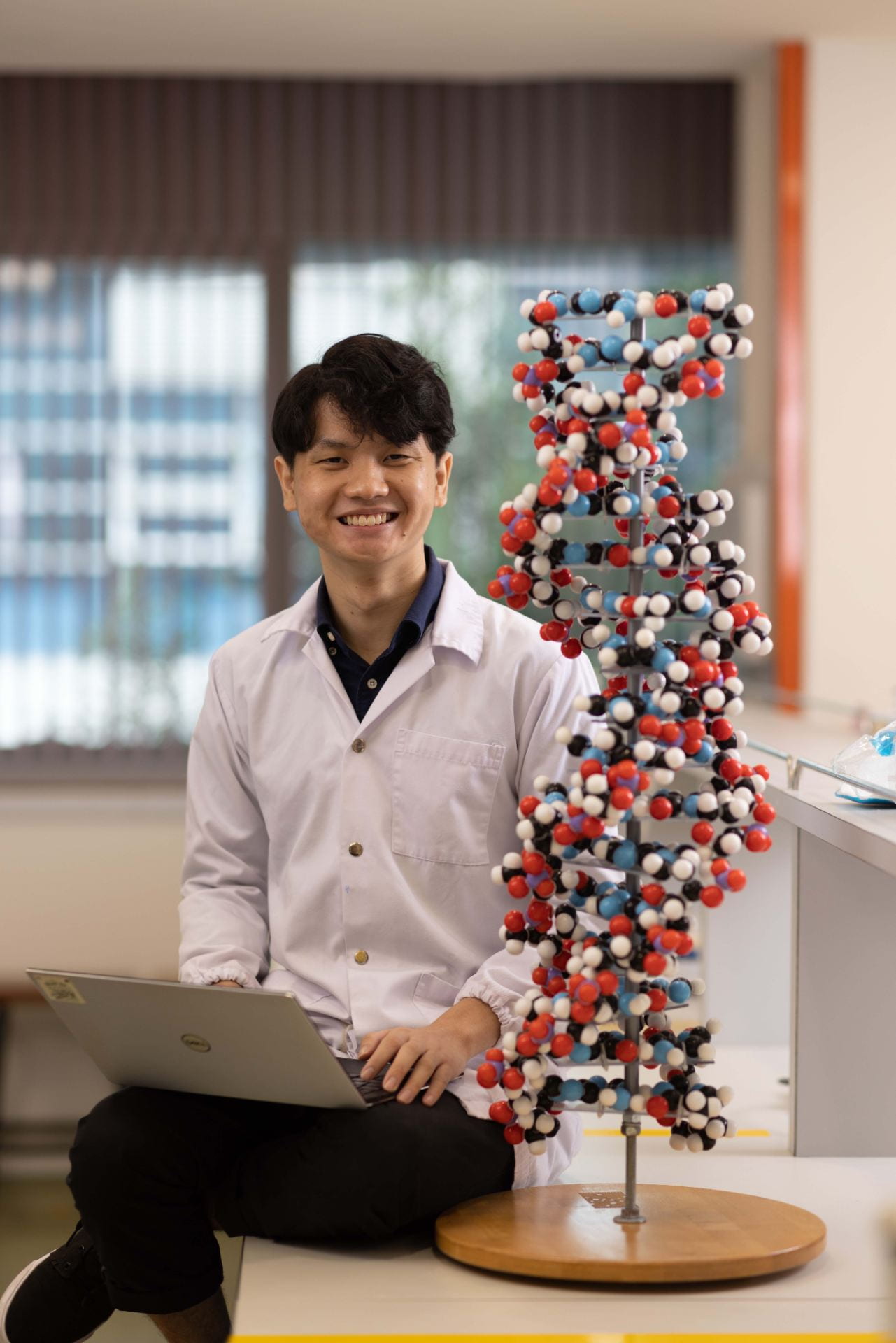As part of NTU School of Biological Science’s (SBS) Meet Our Students series, we connected with undergraduates from the school’s seven different programmes to learn about their motivations behind joining the programme, their experiences here at NTU SBS and more. In this series, we will also address some frequently asked questions about the programme.
The sixth undergraduate we met was Chua Damien, who is currently in his final year of pursuing the Bachelor of Science in Biological Sciences with Second Major in Biomedical Structural Biology programme.

Can you share with us why did you join NTU SBS Biological Sciences & Structural Biology (BSSB) Programme?
I joined NTU SBS BSSB because it was the only undergraduate programme with strong focus in structural biology, a field that is highly interdisciplinary involving bio-organic chemistry, biophysics, mathematics, computational biology, and molecular biology. Furthermore, having several ongoing research projects and global experts in structural biology within Nanyang Institute of Structural Biology in parallel with the undergraduate programme was very enticing to me.
What do you like most about BSSB?
What I liked how BSSB not only equips you with the technical skills of understanding the concepts behind the highly intricate steps in structural biology experimental techniques, but also prompts you to think of the intuition behind applying structural biology in solving and dissecting biological research problems.
Any tips or advice for prospective students of the BSSB Programme?
For anyone interested to join BSSB, my advice is to join us with an inquisitive mind and be sure to be challenged with courses from involving chemistry, physics, and biology. Delve deep to understand how we can use current techniques to understand macromolecular structures and dynamics to understand biology, and eventually translate to clinically relevant therapeutics!

Can you share with us a quote that you live by?
My favourite quote is “Don’t be afraid of failures! Be afraid of succeeding in things that don’t matter.”
What is something special about our school?
A fun fact about our school is there are exciting cross-disciplinary research going on not only above ground but in the basement as well, so join us for endless research opportunities!
What activities have you participated or organised during your course of study at NTU SBS?
In NTU SBS, I have participated and organised great variety of events. I led the College of Science (COS) Day together with my amazing team, with a mini pageant show and talent shows with musical and dance performances. The never-ending opportunities SBS offers for you to pursue the novel ideas you may have to create great memories is ever exciting!
Where did you have your internship at and what did you learn?
During my internship at Singapore Immunology Network (SIgN), A*STAR as a Research Intern, I was involved in benchmarking and developing new computational methods to correct for batch effects in single cell multi-omics datasets. Apart from picking up computational skills in bioinformatics and AI, interacting with colleagues who were computational scientists, I also learnt how to function working with both wet-lab and dry-lab projects simultaneously, which is a very important skill for the modern biologist.
Where did you study at during your exchange programme with SBS and what is your biggest takeaway?
During my exchange, I went to Koc University in Turkey in Year 2. My biggest takeaway is taking modules that focuses on humanities and history of Turkey. It gave me different perspective from what I was accustomed to in science, and ponder about the complex cultural heritage, demographics and politics in country like Turkey. I have also made great friends and interacted with the Turks, which was fun and eye-opening!
I have also done a semestral exchange at NUS in Year 4, where I took an immunology and graduate-level structural biology and proteomics course. With my second major and research experience, I was able to connect and network well with the PhD students taking the module, as well as interacted with exchange students from overseas to tackle the problems and assignments that the Profs gave us. The opportunity to experience college life outside of SBS was enriching and it exposed me to newer ideas that were being shared around students and Profs from another institute.
Connect with Damien: Instagram | LinkedIn
About Bachelor of Science in Biological Sciences with Second Major in Biomedical Structural Biology
Structural biology has gained importance in the biomedical field, with an increasing impact on healthcare and medicine. This programme combines the Biological Sciences (Honours) with Biomedical Structural Biology as a 2nd Major in partnership with Lee Kong Chian School of Medicine and the School of Chemistry, Chemical Engineering and Biotechnology (CCEB).
Students of this interdisciplinary programme will undertake courses related to areas of study in structure-based discovery, structure-based vaccine design, structure -based design of biologics, structure-based design of novel biomaterials and structure-based design of protein engineering.
Find out more here.
What are the minimum subject requirements to apply for BSSB?
Like the Biological Sciences programme, applicants will require a minimum H1 Level pass in Mathematics, and H2 Level pass in Physics/Chemistry/Biology.
If I meet the minimum subject requirements, am I guaranteed a placement in 2nd major Biomedical Structural Biology?
No, as there may be selected applicants called for a selection test or interview before being accepted to the BSSB programme.
What is the difference between Biological Sciences with 2nd major in Medicinal Chemistry & Pharmacology (BSMCP) and Biomedical Structural Biology (BSSB)?
BSSB
Using structural information of disease proteins in virus/bacteria obtained by various imaging methods, such as X-ray crystallography, NMR, cryoEM etc, to identify/design drug targets.
BSMCP
Using chemical synthesis/organic chemistry to synthesise/modify chemical/compound to develop new drugs
